 Libri di Bruce Holsinger su Unilibro.it) Libri di Bruce Holsinger su Unilibro.it)
|
|
1916 |
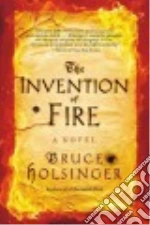 Title :
The Invention of Fire
Title :
The Invention of FireAuthor: Holsinger Bruce Publisher: William Morrow & Co € 14,30
|
|
|
1915 |
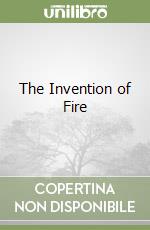 Title :
The Invention of Fire
Title :
The Invention of FireAuthor: Holsinger Bruce Publisher: Thorndike Pr € 32,90
|
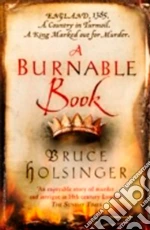 Title :
Burnable book (A)
Title :
Burnable book (A)Author: Holsinger Bruce Publisher: Harper Collins Publishers € 14,20
|
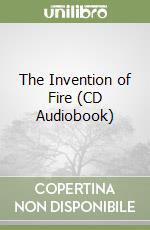 Title :
The Invention of Fire (CD Audiobook)
Title :
The Invention of Fire (CD Audiobook)Author: Holsinger Bruce, Vance Simon (NRT) Publisher: Blackstone Audio Inc € 52,30
|
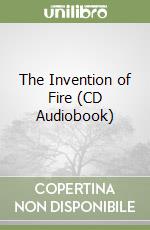 Title :
The Invention of Fire (CD Audiobook)
Title :
The Invention of Fire (CD Audiobook)Author: Holsinger Bruce, Vance Simon (NRT) Publisher: Blackstone Audio Inc € 34,00
|
||
|
1914 |
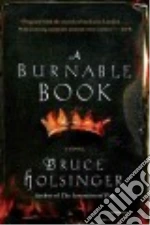 Title :
A Burnable Book
Title :
A Burnable BookAuthor: Holsinger Bruce Publisher: William Morrow & Co In Chaucer's London, betrayal, murder, royal intrigue, mystery, and dangerous politics swirl around the existence of a prophetic book that foretells the deaths of England's kings. Bruce Holsinger's A Burnable Book is an irresistible historical thriller reminiscent of the classics An Instance of the Fingerpost, The Name of the Rose, and The Crimson Petal and the White. London, 1385. Surrounded by ruthless courtiers—including his powerful uncle, John of Gaunt, and Gaunt's artful mistress, Katherine Swynford—England's young, still untested king, Richard II, is in mortal peril, and the danger is only beginning. Songs are heard across London—catchy verses said to originate from an ancient book that prophesies the end of England's kings—and among the book's predictions is Richard's assassination. Only a few powerful men know that the cryptic lines derive from a 'burnable book,' a seditious work that threatens the stability of the realm. To find the manuscript, wily bureaucrat Geoffrey Chaucer turns to fellow poet John Gower, a professional trader in information with connections high and low. Gower discovers that the book and incriminating evidence about its author have fallen into the unwitting hands of innocents, who will be drawn into a labyrinthine conspiracy that reaches from the king's court to London's slums and stews—and potentially implicates his own son. As the intrigue deepens, it becomes clear that Gower, a man with secrets of his own, may be the last hope to save a king from a terrible fate. Medieval scholar Bruce Holsinger draws on his vast knowledge of the period to add colorful, authentic detail—on everything from poetry and bookbinding to court intrigues and brothels—to this highly entertaining and brilliantly constructed epic literary mystery that brings medieval England gloriously to life. € 15,20
|
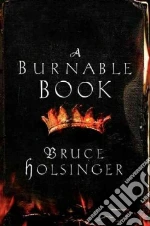 Title :
A Burnable Book
Title :
A Burnable BookAuthor: Holsinger Bruce Publisher: William Morrow & Co In Chaucer's London, betrayal, murder, royal intrigue, mystery, and dangerous politics swirl around the existence of a prophetic book that foretells the death of England's kings in Bruce Holsinger's A Burnable Book, an irresistible historical thriller reminiscent of the classics An Instance of the Fingerpost, The Name of the Rose, and The Crimson Petal and the White. London, 1385. Surrounded by ruthless courtiers—including his powerful uncle, John of Gaunt, and Gaunt's flamboyant mistress, Katherine Swynford—England's young, still untested king, Richard II, is in mortal peril, and the danger is only beginning. Songs are heard across London—catchy verses said to originate from an ancient book that prophesies the end of England's kings—and among the book's predictions is Richard's assassination. Only a few powerful men know that the cryptic lines derive from a “burnable book,” a seditious work that threatens the stability of the realm. To find the manuscript, wily bureaucrat Geoffrey Chaucer turns to fellow poet John Gower, a professional trader in information with connections high and low. Gower discovers that the book and incriminating evidence about its author have fallen into the unwitting hands of innocents, who will be drawn into a labyrinthine conspiracy that reaches from the king's court to London's slums and stews--and potentially implicates his own son. As the intrigue deepens, it becomes clear that Gower, a man with secrets of his own, may be the last hope to save a king from a terrible fate. Medieval scholar Bruce Holsinger draws on his vast knowledge of the period to add colorful, authentic detail—on everything from poetry and bookbinding to court intrigues and brothels—to this highly entertaining and brilliantly constructed epic literary mystery that brings medieval England gloriously to life. € 24,30
|
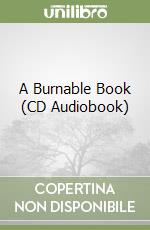 Title :
A Burnable Book (CD Audiobook)
Title :
A Burnable Book (CD Audiobook)Author: Holsinger Bruce, Vance Simon (NRT) Publisher: Blackstone Audio Inc In 1385 London, poet John Gower is asked by Geoffrey Chaucer to find an ancient manuscript that prophesies the end of England's kings, which draws him into a conspiracy that reaches from the king's court to London's slums and potentially implicates his own son. € 50,40
|
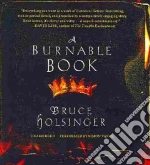 Title :
A Burnable Book (CD Audiobook)
Title :
A Burnable Book (CD Audiobook)Author: Holsinger Bruce, Vance Simon (NRT) Publisher: Blackstone Audio Inc In 1385 London, poet John Gower is asked by Geoffrey Chaucer to find an ancient manuscript that prophesies the end of England's kings, which draws him into a conspiracy that reaches from the king's court to London's slums and potentially implicates his own son. € 40,20
|
||
|
2007 |
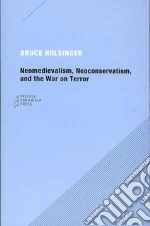 Title :
Neomedievalism, Neoconservatism, and the War on Terror
Title :
Neomedievalism, Neoconservatism, and the War on TerrorAuthor: Holsinger Bruce Publisher: Prickly Paradigm President Bush was roundly criticized for likening America’s antiterrorism measures to a “crusade” in 2001. Far from just a gaffe, however, such medievalism has become a dominant paradigm for comprehending the identity and motivations of America’s perceived enemy in the war on terror. Yet as Bruce Holsinger argues here, this cloying post-9/11 rhetoric has served to obscure the more intricate ideological machinations of neomedievalism, the global idiom of the non-state actor: non-governmental organizations, transnational corporate militias, and terrorist organizations such as al Qaeda.
Neomedievalism, Neoconservatism, and the War on Terror addresses the role of neomedievalism in contemporary politics. While international-relations theorists promote neomedievalism as a model for understanding emergent modes of global sovereignty, neoconservatives exploit its conceptual slipperiness for their own tactical ends. Holsinger concludes with a careful parsing of the Bush administration’s torture memos, which enlist neomedievalism’s model of feudal sovereignty on behalf of the abrogation of human rights. € 11,60
|
|
|
2005 |
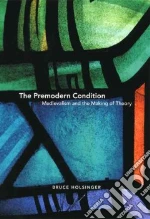 Title :
The Premodern Condition
Title :
The Premodern ConditionAuthor: Holsinger Bruce W. Publisher: Univ of Chicago Pr The Premodern Condition identifies and explains a surprising affinity for medievalism and medieval studies among the leading figures of critical theory. Drawing on a wide range of philosophical, literary-critical, and sociological works produced within the French nouvelle critique of the 1960s, Holsinger argues for reconceiving these discourses, in part, as a brilliant amalgamation of medievalisms. Holsinger shows that the preoccupation with medieval cultures and practices among Bataille, Derrida, Lacan, Barthes, Bourdieu, and their cohorts was so wide ranging that it merits recognition as one of the most significant epiphenomena of postwar French thought. Not simply an object of nostalgic longing or an occasional source of literary exempla, the medieval epoch was continually mined by these thinkers for specific philosophical vocabularies, social formations, and systems of thought. To supplement its master thesis, The Premodern Condition also contains original essays by Bataille and Bourdieu—translated here for the first time into English—that testify in various ways to the strange persistence of medievalisms in French postwar avant-garde writings. What results is an important and original work that will be a touchstone for specialists in medieval studies and critical theory alike. € 36,10
|
|
|
2001 |
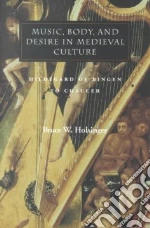 Title :
Music, Body, and Desire in Medieval Culture
Title :
Music, Body, and Desire in Medieval CultureAuthor: Holsinger Bruce W. Publisher: Stanford Univ Pr Ranging chronologically from the twelfth to the fifteenth centuries and thematically from Latin to vernacular literary modes, this book challenges standard assumptions about the musical cultures and philosophies of the European Middle Ages. Engaging a wide range of premodern texts and contexts, from the musicality of sodomy in twelfth-century polyphony to Chaucer’s representation of pedagogical violence in the Prioress’s Tale, from early Christian writings on the music of the body to the plainchant and poetry of Hildegard of Bingen, the author argues that medieval music was quintessentially a practice of the flesh. The book reveals a sonorous landscape of flesh and bone, pleasure and pain, a medieval world in which erotic desire, sexual practice, torture, flagellation, and even death itself resonated with musical significance and meaning. In its insistence on music as an integral part of the material cultures of the Middle Ages, the book presents a revisionist account of an important aspect of premodern European civilization that will be of compelling interest to historians of literature, music, religion, and sexuality, as well as scholars of cultural, gender, and queer studies. € 32,70
|
|